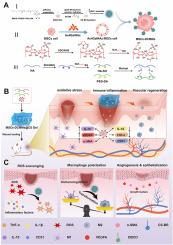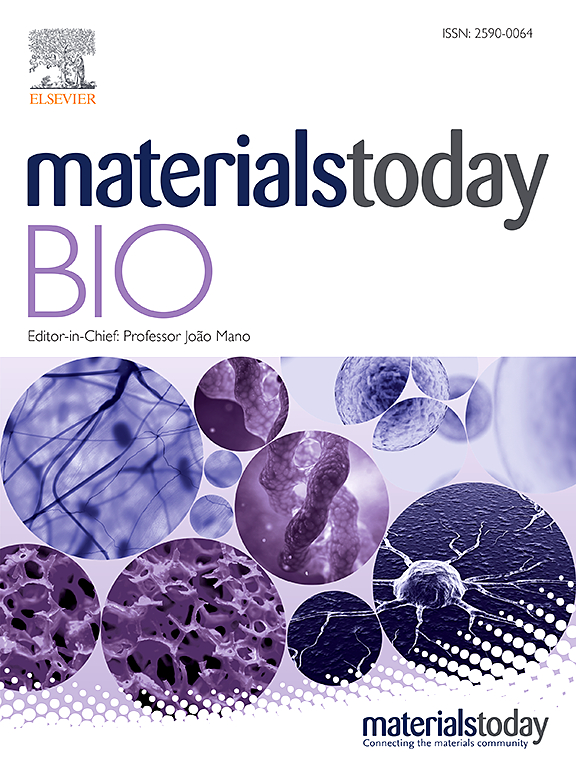Engineered mesenchymal stem cells-laden chondroitin sulfate hydrogel promotes diabetic wound healing through ROS scavenging and macrophage polarization
IF 10.2
1区 医学
Q1 ENGINEERING, BIOMEDICAL
引用次数: 0
Abstract
The treatment of diabetic wound complications has long been a formidable challenge in the clinic, and a multifunctional biomaterial dressing holds great promise as an ideal approach for promoting diabetic wound healing. In this study, we designed a crosslinked chondroitin sulfate (CS) and polyethylene glycol (PEG) hydrogel (CS gel) as a reservoir via a Michael addition reaction. To further enhance the biological functions, surface-engineered mesenchymal stem cells (MSCs) modified with bilirubin-modified chondroitin sulfate-mediated mixed micellar backpacks possessing ROS scavenging/responsive and CD44-targeting abilities (DCMMs) were incorporated into the hydrogel system. The hydrogel served as a physical carrier, providing a sustained-release platform that ensured the long-term presence and controlled delivery of MSCs-tethered micellar backpacks at the wound site. In vitro experiments revealed the remarkable capacity of the hydrogel for ROS scavenging and regulating macrophage polarization. In vivo investigations in diabetic mouse models further confirmed the therapeutic potential, revealing a significant acceleration of wound closure, attenuation of inflammation, and augmentation of angiogenesis. Overall, this innovative hydrogel system that encapsulates surface-engineered mesenchymal stem cells (MSCs-DCMMs) represents a promising remedy and a framework for stem-cell-based therapeutic systems to treat diabetic wounds.

载硫酸软骨素的工程间充质干细胞水凝胶通过清除活性氧和巨噬细胞极化促进糖尿病伤口愈合
糖尿病伤口并发症的治疗一直是临床面临的巨大挑战,多功能生物材料敷料作为促进糖尿病伤口愈合的理想方法具有很大的前景。在本研究中,我们通过Michael加成反应设计了一种交联硫酸软骨素(CS)和聚乙二醇(PEG)水凝胶(CS凝胶)作为储层。为了进一步增强生物功能,将胆红素修饰的硫酸软骨素介导的具有ROS清除/响应能力和cd44靶向能力(DCMMs)的表面工程间充质干细胞(MSCs)纳入水凝胶体系。水凝胶作为物理载体,提供了一个持续释放的平台,确保mscs捆绑胶束背包在伤口部位的长期存在和控制递送。体外实验表明,水凝胶具有明显的清除ROS和调节巨噬细胞极化的能力。在糖尿病小鼠模型的体内研究进一步证实了其治疗潜力,显示出伤口愈合的显著加速,炎症的衰减和血管生成的增强。总的来说,这种包裹表面工程间充质干细胞(msc - dcmms)的创新水凝胶系统代表了一种有希望的补救措施和基于干细胞的治疗系统的框架,以治疗糖尿病伤口。
本文章由计算机程序翻译,如有差异,请以英文原文为准。
求助全文
约1分钟内获得全文
求助全文
来源期刊

Materials Today Bio
Multiple-
CiteScore
8.30
自引率
4.90%
发文量
303
审稿时长
30 days
期刊介绍:
Materials Today Bio is a multidisciplinary journal that specializes in the intersection between biology and materials science, chemistry, physics, engineering, and medicine. It covers various aspects such as the design and assembly of new structures, their interaction with biological systems, functionalization, bioimaging, therapies, and diagnostics in healthcare. The journal aims to showcase the most significant advancements and discoveries in this field. As part of the Materials Today family, Materials Today Bio provides rigorous peer review, quick decision-making, and high visibility for authors. It is indexed in Scopus, PubMed Central, Emerging Sources, Citation Index (ESCI), and Directory of Open Access Journals (DOAJ).
 求助内容:
求助内容: 应助结果提醒方式:
应助结果提醒方式:


